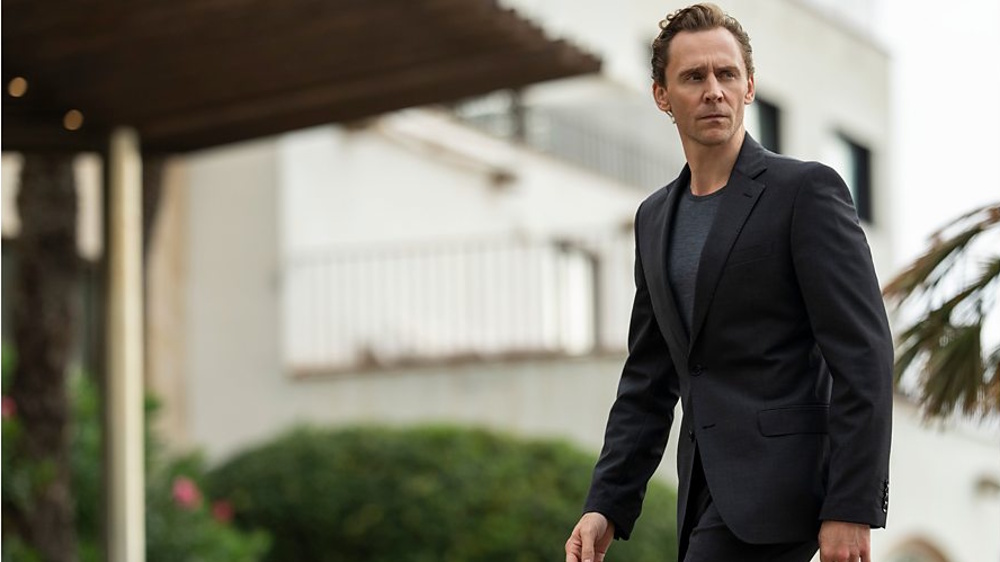HBO's Watchmen Episode 5: All The Big References To The Original Comic Book
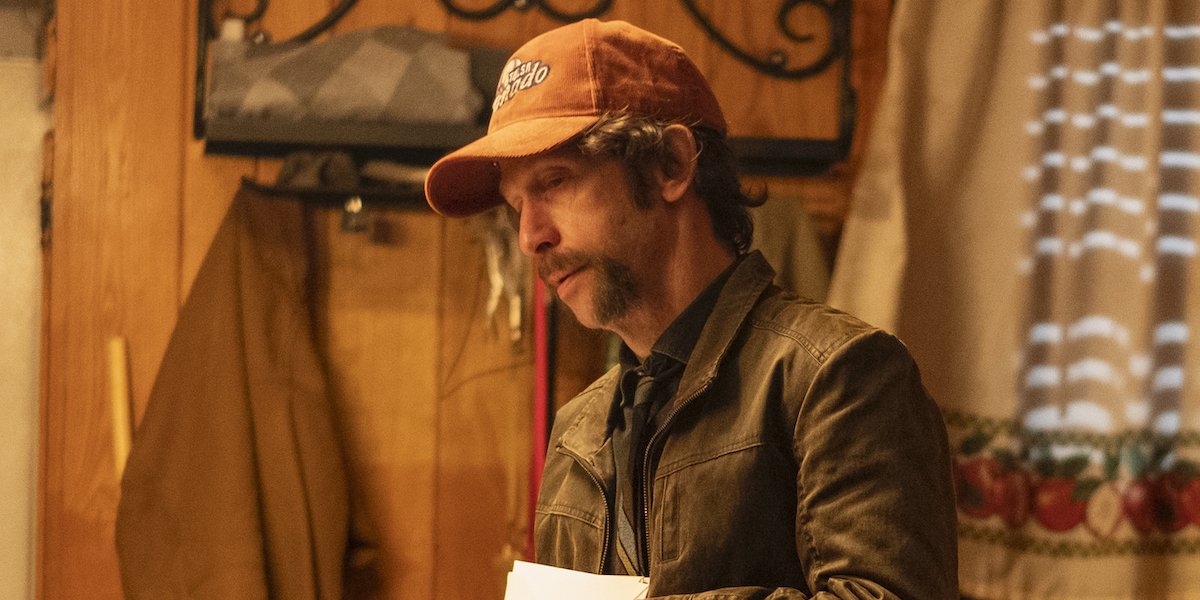
CinemaBlend participates in affiliate programs with various companies. We may earn commission when you click on or make purchases via links.
Major spoilers below for anyone who isn't currently caught up with Watchmen. You have been warned.
The show that needs no introduction beyond one of the most respected comic book works in the medium's history, HBO's Watchmen delivered another bamboozling time-spanning installment with Episode 5. I'd have called it a head-scratcher, only it's futile trying to scratch my head through the reflective material in the hat I'm wearing. To be expected, it delivered a slew of direct and thematic references to Alan Moore and Dave Gibbons' Watchmen comic series.
Perhaps unexpectedly, though, Damon Lindelof & Co. answered some pretty big questions with "Little Fear of Lightning." Not only did viewers get to learn Looking Glass' origin story, so to speak, but we also learned that it tied directly back to Viedt's squid hoax. The episode heavily mirrored the comic book's reflection-geared fifth issue, and contained a slew of visual callbacks to the source material, particularly in that wild opening sequence.
For those who haven't been keeping up with our comic book reference rundowns, check out everything we found in Episode 1, Episode 2, Episode 3 and Episode 4. (And for those who need a new copy of Watchmen for their home library, check this link.)
Comic Newspaper Headlines As Radio Broadcasts
Watchmen's pages were filled with newspaper headlines that served to build up the alt-history world around the core characters, and this episode's title screen incorporated a selection of headlines as radio news broadcasts. Included were "Eastern Europe: Tanks Mass As Conflict Escalates" seen in Chapter X, "California Governor Urges Hard Line" seen in Chapter VIII, and "French Withdraw Military Commitment From NATO" from the newspaper The Comedian was reading at that all-important meeting of the Crimebusters in Chapter I. (I admittedly couldn't pick out what one of them was.)
The Veidt Method Ad
The episode started off on that infamous day in 1985, at a New Jersey carnival, where we get a clear shot of the oft-seen advertisement for the self-help book The Veidt Method, as located on the back cover of the Black Freighter comic book. The book focused on Adrian Veidt's near-superhuman mental and physical prowess, while also espousing his various philosophies and world-views.
Your Daily Blend of Entertainment News
One of GWAR's more transparent mottos was "Castrate All Rapists," and their logo was the traditional female symbol, only with teeth drawn into the loop at the top. That symbol, which was perhaps meant to call to mind Vagina Dentata imagery, also resembles the squid's freaky mouth, though obviously not intentionally.
Like many things put out into the world by Veidt in the 1980s and beyond, The Veidt Method was little more than a farce, considering only the tiniest percentage of its readers would be able to come close to developing Ozymandias-level abilities, if anyone. It definitely wouldn't have helped anyone reading it in New York City on 11/2.
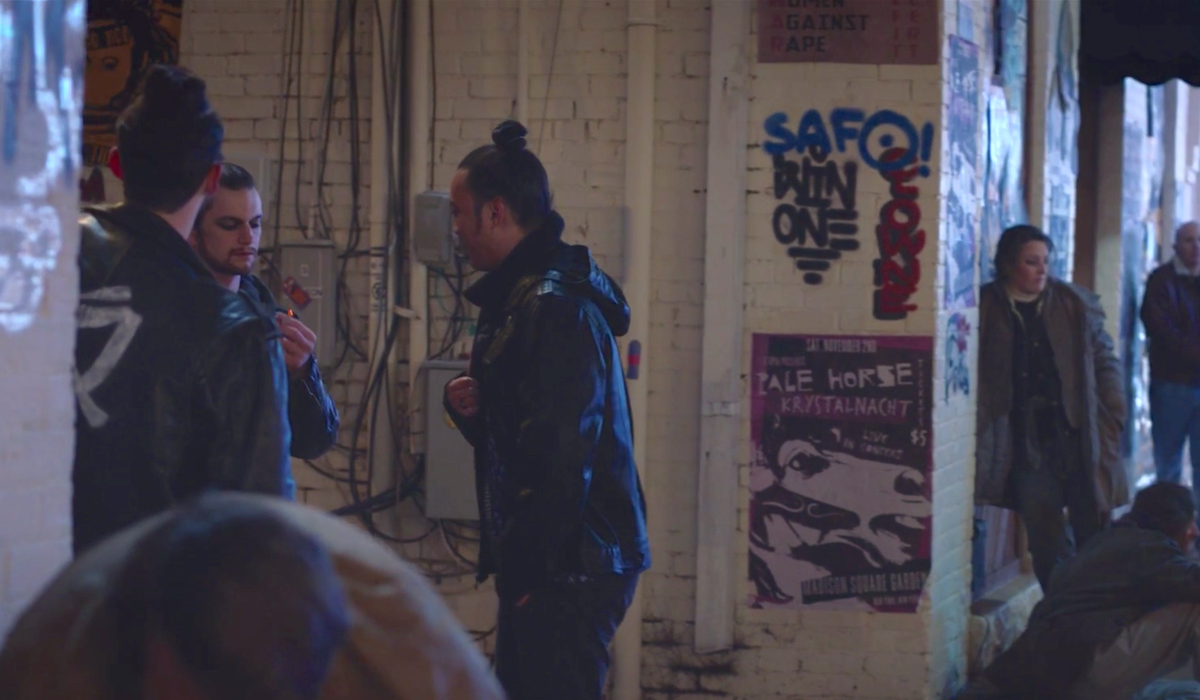
Pale Horse Concert Poster
The band Pale Horse served as a mostly unseen presence in Watchmen's comic issues, with its name a Biblical reference to the steed that Death rode in on with the other Horsemen of the Apocalypse. Hell was certainly brought to Madison Square Garden on the night of their big concert, which coincided with the squid monster's nightmarish arrival. Watchmen delivered the ultimate comic book tie-in with the first volume of its official soundtrack series, the faux Sons of Pale Horse album The Book of Rorschach, which was filled with intriguing background tie-in information.
In the TV show, it appeared on a building wall just outside the street carnival that Looking Glass attended. Sadly, it would be the last big marketing promotion the band got, though Paula Malcomson's Seventh Kavalry member Renee did reveal in this world, Steven Spielberg directed the Oscar-sweeping biopic Pale Horse: The Movie, which featured a girl in a red coat calling out for her mother. So does that mean he didn't do Jurassic Park and/or Schindler's List?
Top-Knots
In Watchmen's version of the early '80s, people across the country had adopted the upper-head ponytail hairstyle known unaffectionately as the top-knot. It was heavily implied that this style was made popular by the lead singer of the band Pale Horse, but the fact that an assorted number of criminals also sported top-knots kept things fairly ambiguous concerning the general public's opinions about the hairdo. The Watchmen series prominently displayed a few characters rocking the look at the street carnival.
Gay Women Against Rape Poster
Another big comic reference that appeared near the New Jersey street carnival was a poster for the militant feminist group GWAR – not to be confused with the theatrical hard rock band – whose name stands for Gay Women Against Rape. Though the top of the poster is cut off, it can be safely assumed that the poster was an advertisement for the Benefit Concert being headlined by the gay-friendly band Pink Triangle, which was a referenced event within the comic book.
Watchmen's Palindromic Fifth Issue
Once young Wade Tillman entered the carnival funhouse's hall of mirrors, it became abundantly clear that this episode was a deliberate homage to Alan Moore and Dave Gibbons' fifth Watchmen issue, which orchestrated Rorschach's framing and false arrest for the murder of former crime boss Moloch. The issue itself was a palindrome that started and ended on similar notes, utilizing all manner of visual synchronicity throughout, including Watchmen's only two-page splash during the (fake) attempt to murder Adrian Veidt.
The Watchmen TV show tackled that concept beautifully with this fifth episode, which is not coincidentally the exact mid-point of Watchmen's nine-episode season. Wade's mind broke on 11/2, thanks not only to the squid disaster, but also to the anti-religious female who left him naked and self-hating amidst all of his reflections. (His mind obviously didn't break quite as much as those who died that night.) Both incidents informed the man who became Looking Glass, and perfectly set up the way he allowed Sister Night to implicate herself in Judd's murder, in that she would be sent into a dangerous abyss after being stripped of her Sister Night persona.
It was a genius replication of Rorschach's fall from grace, down to the super-violent inciting incident that allowed the vigilante mindset to take over. In the comic, Rorschach mentally usurped Walter Kovacs following his brutal discovery of a child killer, whose dogs were feasting on the victims' bones. (Both Looking Glass and Rorschach came out of their respective situations covered in blood, too.) And even when the narrative wasn't folding in on itself, director Steph Green filled the screen with repeating reflections that drove the theme home.
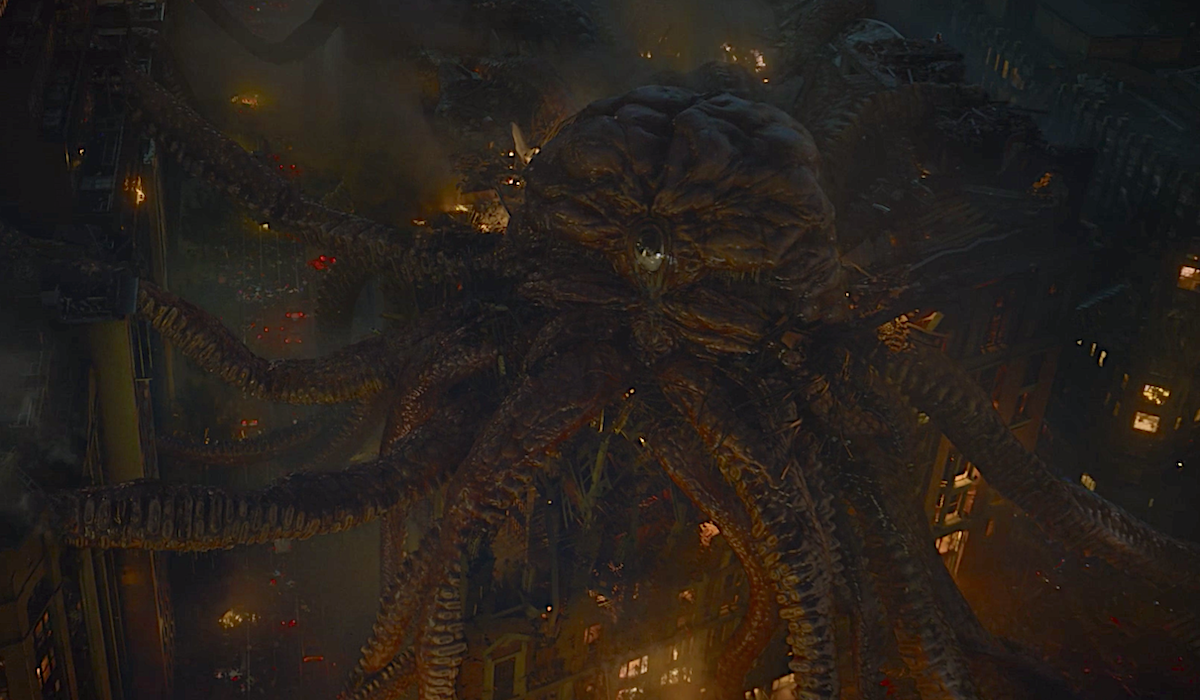
Adrian Veidt's Squid Monster Disaster
This episode gloriously affixed an exclamation mark to all of the talk surrounding the monstrous act that killed over 3 million people and mentally debilitated many others. Yes, Damon Lindelof's creative team WENT THERE in the opening minutes and delivered the multi-tentacled money shot that Watchmen fanatics had never seen in live-action before. Following Wade's personal nightmare, the camera took to the sky and flew over various fires and blackouts before arriving at the super-gnarly source of it all: Veidt's giant squid monster bursting through the Institute of Extraspatial Studies where the teleportation tech was housed.
While Zack Snyder's 2009 film opted not to directly adapt the squid hoax, the HBO series dove in with both feet, giving fans a comic-faithful eyeful (pun intend-squid) of the deadly monster and the destruction its world-altering arrival caused. I mean, I feel back for all those people who died, but hot damn, was it a jolt to see that one-eyed fucker (to quote LG) up close and impersonal.
Watchmen: 6 Thoughts About HBO's Show From Someone Who Didn't Read The Comic
The Importance Of Titles
"Little Fear of Lightning" is a piece of a quote taken from a longer line in Jules Verne's 20,000 Leagues Under the Sea: "If there were no thunder, men would have little fear of lightning." The connections between that work and Watchmen are fairly obvious, considering both concern the hazardous impact of a freaky-looking creature, and they both feature main characters driven to ideological extremes by their obsessions. Haven't we heard the name Nemo on this show somewhere already?
Looking Glass Loves Him Some Beans
Not for the first time, the Watchmen TV show featured Looking Glass sitting back and having himself a few spoonfuls of beans, taken straight from the can. Rorschach notably favored the same kind of sustenance in the comic book, though its presence in this Rorschach-driven episode feels slightly more meaningful.
Hooded Justice And Captain Metropolis' Relationship
Looking Glass was watching an American Hero Story: Minutemen episode that featured a lewd-though-mostly-costumed sex scene between the Golden Age vigilantes Hooded Justice and Captain Metropolis, whose romantic relationship wasn't public knowledge until Under the Hood's publication. Though Metropolis (a.k.a. Nelson Gardner) wanted Hooded Justice to take his hood off, the latter claims his face will never be seen, which ties into Hooded Justice's ambiguous fate and identity within the Watchmen universe. Gardner does state in the Before Watchmen: Minutemen series (where Hooded Justice is supposedly killed) that he never did learn of his former lover's identity.
More Squids!
The episode hammers home just how heavily Wade Tillman was knocked for a loop by the events on 11/2, to the point where he completed a residency training program in Extraterrestrial Squid Science, focusing on the erroneous line of thinking that there were other psychic creatures out there potentially waiting to destroy another part of the world. Who would have guessed that Looking Glass would keep a newspaper clipping from the squid disaster on his wall near his security system and (squi)diploma. It's also meaningful that, as Wade, he leads a support group of people stuff suffering from Veidt's scheme.
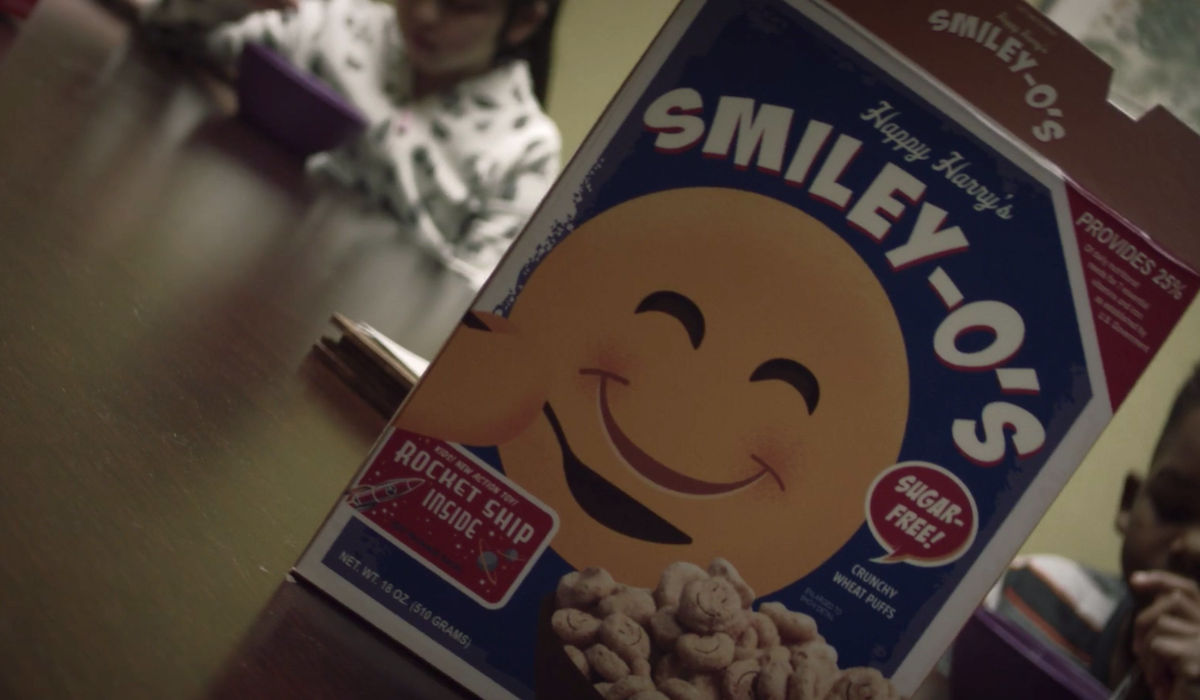
Happy Harry's Smiley-O's
The sugar-less breakfast cereal being served to the focus group kids is a trifecta of comic references. The most obvious is the central smiley face image, calling to mind The Comedian's non-bloodied button. The second is the rocket ship toy included, with its weirdly old-school design calling to mind the space race that coincided with Doctor Manhattan's rise in prominence.
The third reference, which is also the most bizarre, is the company Happy Harry's. In the Watchmen comic book, Happy Harry's is the skeezy NYC bar often populated by untrustworthy criminals. Rorschach used it as a hub of information that he can violently extract from its unwilling patrons, so it's rather mind-blowing to see the name affixed to a kid-friendly breakfast food. Is it a coincidence, or did the events of 11/2 inspire Happy Harry to trade bar-owning for food production?
Forever Pet
I'd previously brought up Adrian Veidt's humanoid clones Mr. Phillips and Ms. Crookshank when referencing the cloning elements of Watchmen's comic narrative, but the company Forever Pet is a more direct callback to Veidt's genetically modified pet Bubastis. The creature was sacrificed in the final issue and then cloned for the recent Doomsday Clock arc, and the antagonist's adoration for his potentially semi-sentient pet is embodied in the goal that Forever Pet shares of allowing owners to keep their loved animals with them for life.
Since we're on the subject, I think that Bubastis' death is mirrored in the offhandedly casual way that Eileen Grubba's Cynthia, ex-wife of Looking Glass, disposes of that minutely imperfect dog clone. It's a non-visual death that viewers can assume is painless and instantaneous, which is perhaps intentionally the opposite of Rorschach's dog experience.
Nostalgia Pills
Will's medicine bottle, which is possibly just a Macguffin to lure Angela's Sister Night into the deeper plot, was revealed to contain Nostalgia pills. In the Watchmen comic, Nostalgia was the popular perfume whose marketing campaign was Veidt's thematic precursor to his squid plot.
In the TV show, the Nostalgia name has been taken over by pills containing memories that are somehow imparted to those who digest the meds. It's a very interesting evolution of the concept, though the process isn't yet fully understandable, assuming it ever will be. Taking the pills causes psychosis, which isn't good for Angela, who chugged down the bottle's contents.
Tobacco Is A No-No
The Watchmen comics handle smoking in unique ways, in that characters mainly either smoke hand-rolled cigarettes or they use the kind of glass ball-shaped pipes that Laurie kept handy. Episode 2 featured the cigar-smoking German, and Episode 5 revealed through Renee's makeshift cigarettes that tobacco became a controlled substance at some point before 2019. Not that Renee was very secretive about her vices at any point, and her actions were possibly a clever maneuver to attract the anti-authority side of Looking Glass' personality.
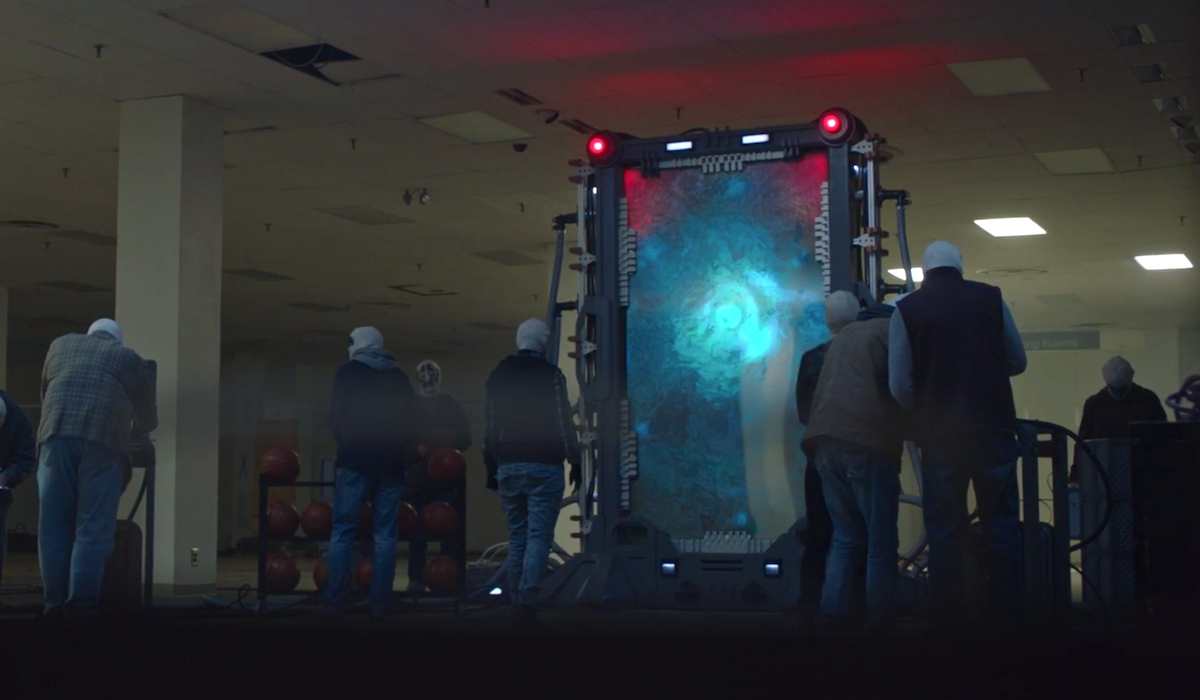
The 7K's Blue-Hued Teleporters
Veidt's Institute for Extraspatial Science utilized Doctor Manhattan's intelligence and physics-altering behavior for human-world applications, with the teleportation technology arguably being the most nefarious influence. It turns out the Seventh Kavalry is attempting to replicate this technology in the building housing their fake church set. With Doctor Manhattan's signature blue glow coming from the machines, the criminal organization has yet to perfect the technique – they're currently sending basketballs to seemingly random locations – for use in their yet-to-be-revealed sinister plot. This is presumably part of what the members were collecting all those watch batteries for, and it would be thematically fitting for Doctor Manhattan to once again be somewhat responsible for any impending destruction.
That Wall Of Screens
Adrian Veidt is a big fan of sitting before a variety of TV screens so that he can soak up all of the information that he can take in, and his familiar array isn't the only collection of screens that show up in Watchmen's comic book. On the TV show, which apparently hasn't embraced gigantic flat-screen monitors, Looking Glass is shown Adrian Veidt's video via just such a multi-view display. As if there was any other way for the mogul's message to have been presented.
Veidt's Confession Video
While Watchmen's sizable audience knew that the public now believes Adrian Veidt to be dead after a seven-year disappearance, the TV show hasn't fulled delved into what happened with him after the 11/2 massacre. In Episode 5, however, the Seventh Kavalry-leading Senator Keene showed Looking Glass an hours-long video (that was pirated, yuk yuk) of Jeremy Irons' Veidt blatantly confessing to perpetrating the squid hoax, which understandably upends Looking Glass' paranoia-fueled world. The video was recorded on November 11, 1985, and it basically confirmed his comic book machinations, while also anecdotally confirming that Veidt was partially responsible for getting the liberal-minded Robert Redford elected as President.
Mercy Fragrance
As discussed earlier, Veidt used fragrances as part of his pre-squid plotting, with Nostalgia being his most prominent effort. This episode had Looking Glass overseeing a focus group testing the perfume Mercy, and though it isn't stated who was behind the fragrance's creation, I think we can agree that we're meant to read into this in the same way that the comic perfume was.
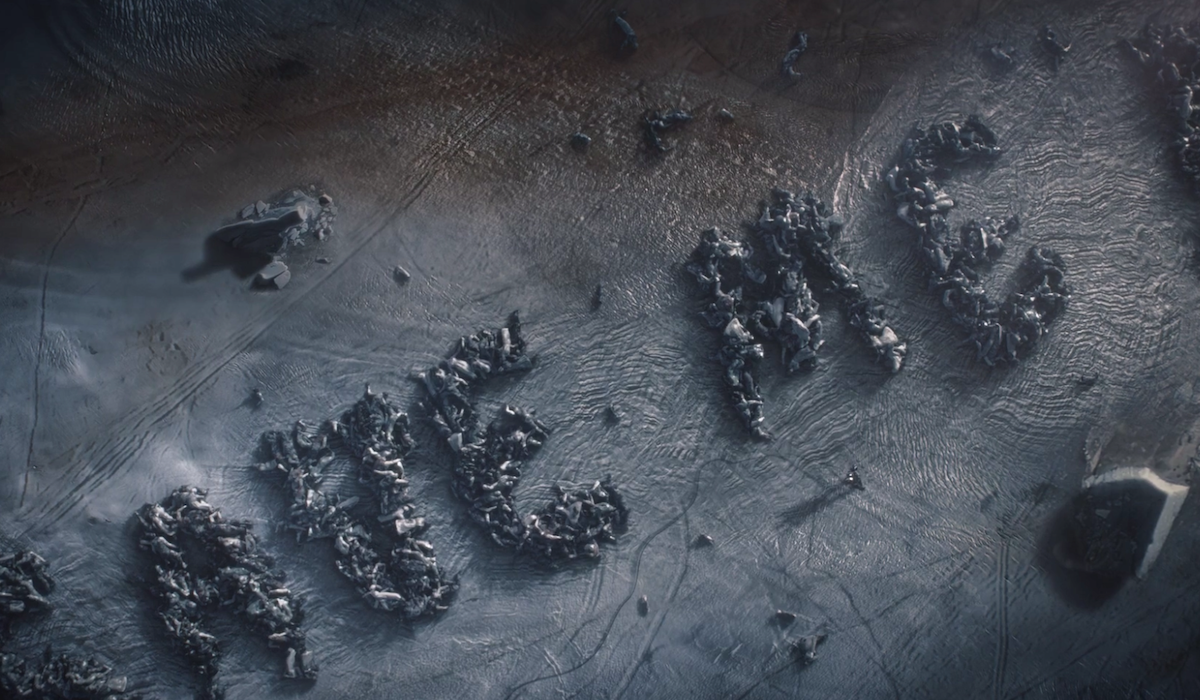
Other Random Thoughts
I like that the play Oppenheimer was the one on display during the Come Back to New York promo. J. Robert Oppenheimer was, of course, the physicist involved in the infamous Manhattan Project who, among others, earned the unofficial moniker "the father of the atomic bomb." This is assumedly indicative of the public's more science-based interests thanks to Doctor Manhattan.
Can we assume that Lady Trieu's daughter – if that actually is her daughter, so to speak – has been given some of those Nostalgia pills, which caused her Vietnam-related nightmares?
I wasn't sure whether or not Renee and the other 7K member counted as far as the whole "Two Riders Were Approaching" theme goes in Watchmen, but I have to assume a later episode will delve into that idea more heavily.
I'm definitely going to do some heavy thinking about where in the hell Adrian Veidt is right now, and how he knew that satellite was going to be flying by at that precise moment.
Join us again each week for more Watchmen-obsessed fun when the HBO series airs every Sunday night at 9:00 p.m. ET.

Nick is a Cajun Country native and an Assistant Managing Editor with a focus on TV and features. His humble origin story with CinemaBlend began all the way back in the pre-streaming era, circa 2009, as a freelancing DVD reviewer and TV recapper. Nick leapfrogged over to the small screen to cover more and more television news and interviews, eventually taking over the section for the current era and covering topics like Yellowstone, The Walking Dead and horror. Born in Louisiana and currently living in Texas — Who Dat Nation over America’s Team all day, all night — Nick spent several years in the hospitality industry, and also worked as a 911 operator. If you ever happened to hear his music or read his comics/short stories, you have his sympathy.
